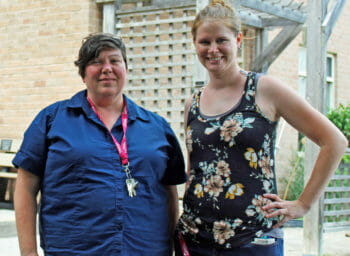
Mental Health and Addictions Counsellor Sariah and Life Skills and Community Worker Kim walk alongside Supportive Housing residents, helping them reach their goals and build connection and belonging.
The impact of the opioid crisis is continuing to be felt throughout Waterloo Region, including at House of Friendship.
But thanks to the Housing First model that is used in our Supportive Housing programs at Charles Village and Eby Village, individuals who need housing can find a place to call their own – regardless of where they are at on their journey.
“Housing first means we treat housing as a basic right, with no conditions,” said Lula Woldemariam, Supportive Housing Manager at House of Friendship. “You don’t need to be sober or not using.”
By taking this approach, individuals can get housing – and the support that goes with it – without first addressing their addiction, something that is nearly impossible to do while living on the streets.
“When we are asking someone to deal with every challenge in their life without a roof over their heads, we aren’t setting them up for success,” said Lula.
The reality is, the majority of the men staying at the Charles Street Men’s Shelter are struggling with mental health and/or addiction as well as many of those who are in our Supportive Housing program. For many, the roots of addiction relates to traumatic childhood experiences, including sexual abuse.
“They are numbing themselves – doing what they can to survive,” said Sariah Middleton, Housing Mental Health and Addictions Counsellor. “My role is to assist them with what they need, with no judgment.”
Sariah meets with program participants, both in Supportive Housing and at the Charles Street Men’s Shelter, helping them address the root causes of their addiction, and develop personalized goals around their substance use.
For some, the first step in their journey is using less often. This means that making safe choices if they continue to use, which can include having a naloxone kit in case of overdose. Sariah can also connect individuals to addiction programs in our community, and accompany them to initial appointments.
But most of all, her role is to listen, to hear their stories. “I provide a safe place for someone, perhaps the first they’ve had.”
This approach helps address both the challenges of addiction and the danger of overdose, as well as the ongoing problem of homelessness in our community.
Sariah also provides group sessions for both Supportive Housing and Shelter participants, including those who don’t struggle with mental health and/or addiction, addressing such topics as how to manage chronic pain, how to be a good neighbour to those struggling with addiction, and setting boundaries by learning to say no.
Your ongoing support helps men and women stay housed, with the help that they need. Thank you!